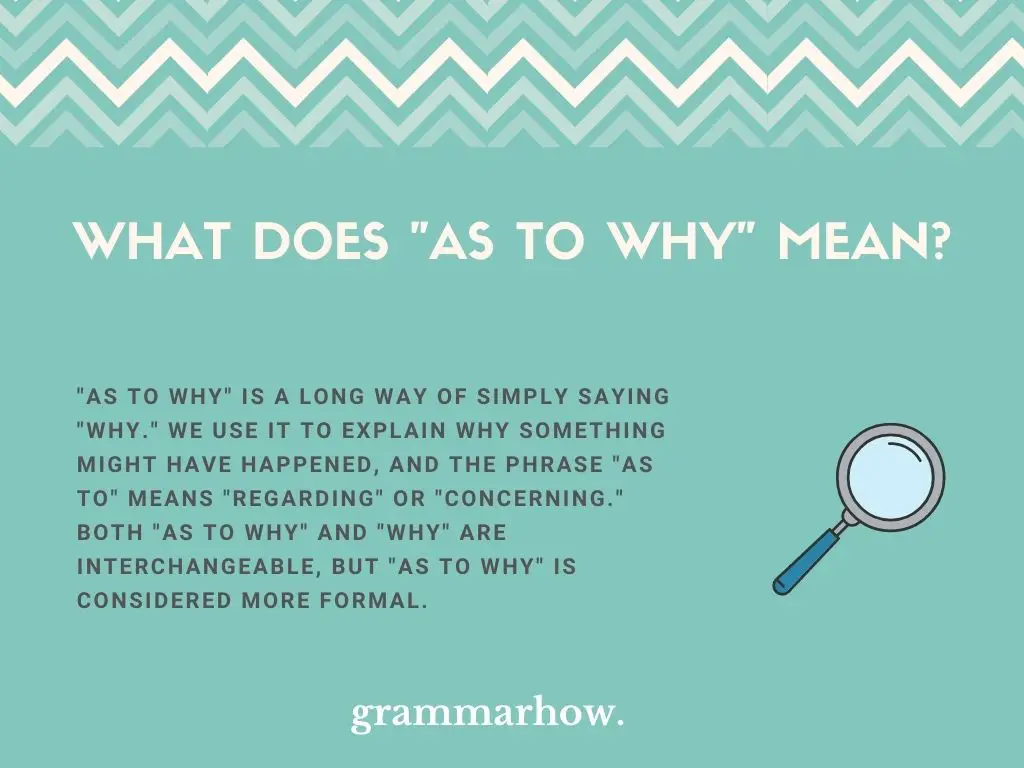The phrase “as to why” isn’t commonly used, but you still might come across it. For that reason, we think it’ll help to explain what the meaning of the phrase is and how we can make the most of it before we write it.
What Does “As To Why” Mean?
“As to why” is a long way of simply saying “why.” We use it to explain why something might have happened, and the phrase “as to” means “regarding” or “concerning.” Both “as to why” and “why” are interchangeable, but “as to why” is considered more formal.

Is “As To Why” Grammatically Correct?
There is nothing fundamentally wrong with using “as to why.” This section will aim to explain why people seem to use it, even though “as to” seems to be redundant in itself.
“As to why” is grammatically correct. “As to” means regarding,” and we use “why” to explain something. “As to why” means “regarding this explanation.”
It works well in sentences, but some people see “as to why” as redundant. You can see that in the following ways:
- Her explanation as to why she didn’t fancy going out today was weak.
- Her explanation why she didn’t fancy going out today was weak.
Both of these sentences are correct, though it’s more common to use “as to why” in this regard. It isn’t a redundancy, and we can use it whenever we feel it works best for us.
Does “As To Why” And “Why” Mean The Same?
“As to why” and “why” mean the same thing. The only difference in use comes from context. There are plenty of chances where “as to why” works better (mostly in formal contexts).
You’ll often see “as to why” come up with words like “explanation” or other nouns in that regard. “Why” on its own tends to come up more when we’re using verbs.
- The explanation as to why these things occurred is still up in the air. (Noun: explanation)
- The investigation as to why she did these things has ended. (Noun: investigation).
- She explains why she did it, but I don’t listen to her. (Verb: explain).
- We investigated why they went there, but we found no reason. (Verb: investigate).
Examples Of How To Use “As To Why” In A Sentence
Let’s go over some examples so you can see more ways how “as to why” works in sentences. Once you’ve seen these, you’ll have a much better understanding of when it’s most appropriate for you.
- Her explanation as to why she did it makes no sense to me.
- The explanation as to why there are no jobs anymore was unfounded.
- My thoughts as to why something like this could have happened are confusing.
- My feelings as to why she left me are irrelevant.
- The investigation as to why these poor people endured this has to come to a close soon!
- The meeting as to why I behaved the way I did came to no avail.
- The explanation as to why I didn’t bother helping was easy to come up with.
“As to why” works best when we use a noun before it. It’s a way of saying that something “concerns” the explanation or reasoning of something else.
Is It “As To Why” Or “As Of Why”?
“As to why” is the correct phrase because “as to” means “concerning.” We use it when we want to say that something is concerning a particular reason. “As of why” is incorrect because “as of” is a preposition that indicates a certain time frame (which doesn’t work here).
You might see “as of” work in the following ways:
- As of now
- As of late
However, “now” and “late” are time periods. “Why” is not a time period of any kind, which is why it doesn’t work with “as of.”
As To Why – Synonyms
Finally, let’s go over the best synonyms and alternatives to the phrase. If you’re struggling with the difference between “as to why” and “why,” some of these might be more beneficial to you.
- Why
- Concerning why
- Regarding why
- Respecting why
- In regard to why
- With reference to why
- With respect to why
- In connection with why
These synonyms all work well to replace “as to why” as a phrase.
